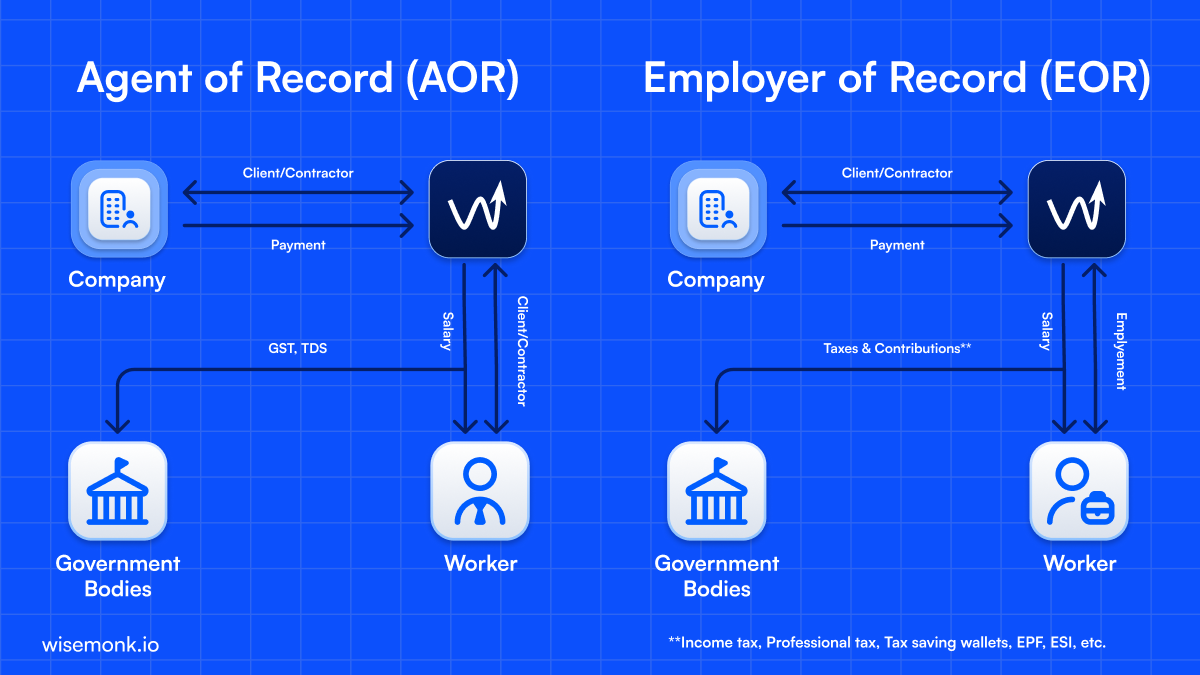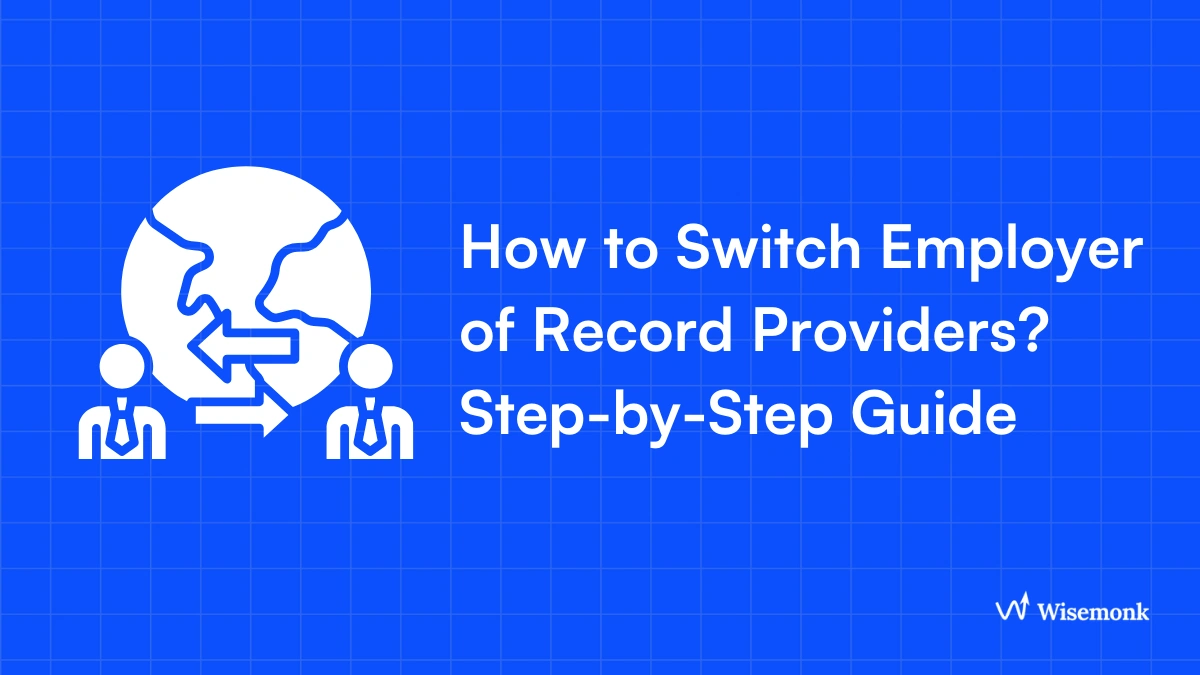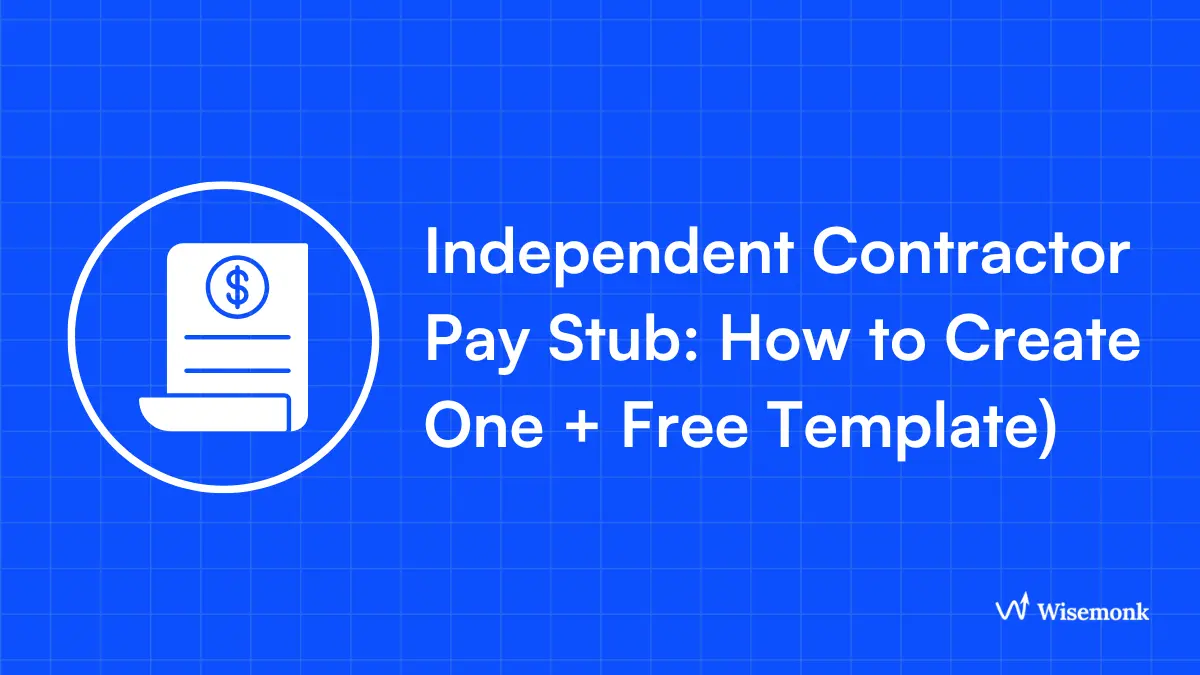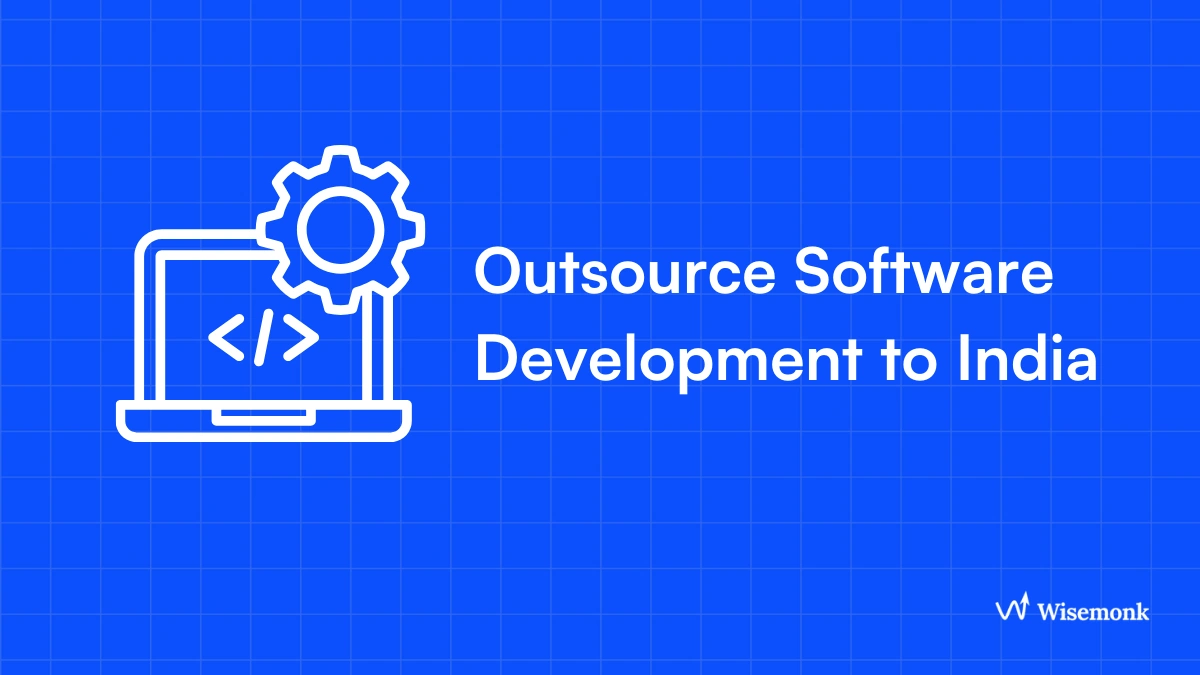- AOR manages contractors. They handle contracts, payments, and compliance for independent contractors globally. You stay in control but still carry final legal responsibility for misclassification.
- EOR employs your team. They become the legal employer for full-time employees, managing payroll, benefits, taxes, and compliance. No local entity needed.
- Choose AOR for contractors. Best when hiring freelancers or project-based workers. The AOR coordinates payments and paperwork according to local labor laws.
- Choose EOR for employees. Best when hiring full-time staff in foreign countries. The EOR handles all HR, payroll, and compliance without you setting up an entity.
Need help with your global workforce? Contact us today!
Discover how Wisemonk delivers trusted international solutions.
AOR vs EOR: which one do you actually need? An AOR manages contractors (payments and compliance), while an EOR becomes the legal employer for full-time employees (payroll, benefits, and labor laws). 67% of US companies choose the wrong one first, costing months and thousands in fixes.
This guide covers when to use each, how they work, what they cost, and which matches your hiring needs.
What is an Agent of Record (AOR)?
An AOR is a third-party service that manages your independent contractors globally. You control the work, they handle contracts, payments, and compliance so you don't need a local entity.
What AOR services include:
- Contractor classification and onboarding
- Compliant contracts and service agreements
- Global payment processing and invoicing
- Compliance with local labor laws and tax regulations
- Documentation and recordkeeping
- Audit and reporting support
Need more details on AOR compliance and benefits? Read our in-depth Agent of Record explainer.
Here’s how the AOR process works:
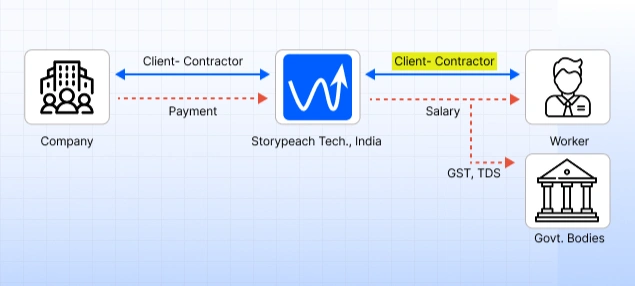
You hire the contractor. The AOR classifies them correctly, drafts compliant agreements, and sets up payments in their local currency. They track compliance requirements, manage renewals, and keep audit-ready records. You manage the work, they manage the paperwork.
An AOR doesn't become the legal employer, it only supports contractor management.
If you need to hire employees under local employment laws, you'll need an Employer of Record (EOR) instead.
What is an Employer of Record (EOR)?
An EOR is a third-party service that becomes the legal employer for your international employees. They handle employment contracts, payroll processing, tax withholding, employee benefits, and labor law compliance in countries where you don't have a legal entity. You manage the employee's work and performance while the EOR manages all employer responsibilities.
What EOR services include:
- Legal employment and compliant contracts
- Payroll processing and tax withholding
- Employee benefits (health insurance, retirement, leave)
- Labor law compliance and HR support
- Onboarding and offboarding
- IP and data protection
Want a deeper dive into EOR services? Check out our complete guide to Employer of Record to understand how this model works.
Here’s how the EOR process works:
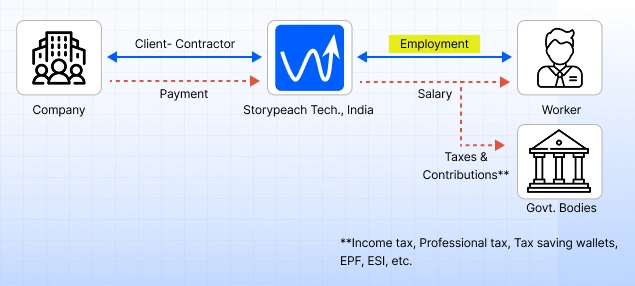
You choose the employee. The EOR hires them legally, runs payroll, manages benefits, and handles compliance in their country. You direct their work while the EOR takes care of time consuming tasks like tax filings and administrative burden across multiple countries.
This lets you hire talent globally without setting up a legal entity in foreign markets. Unlike a professional employer organization (PEO), an EOR assumes full legal liability, helping you avoid costly mistakes when expanding into new countries.
What are the key differences between an AOR and an EOR?[toc=AOR vs EOR: Key Differences]
Here's the simple version: if you're hiring contractors, you need an AOR. If you're hiring employees in countries where you don't have an entity, you need an EOR.
But the details matter, choosing wrong can cost you months in delays and thousands in compliance fixes.
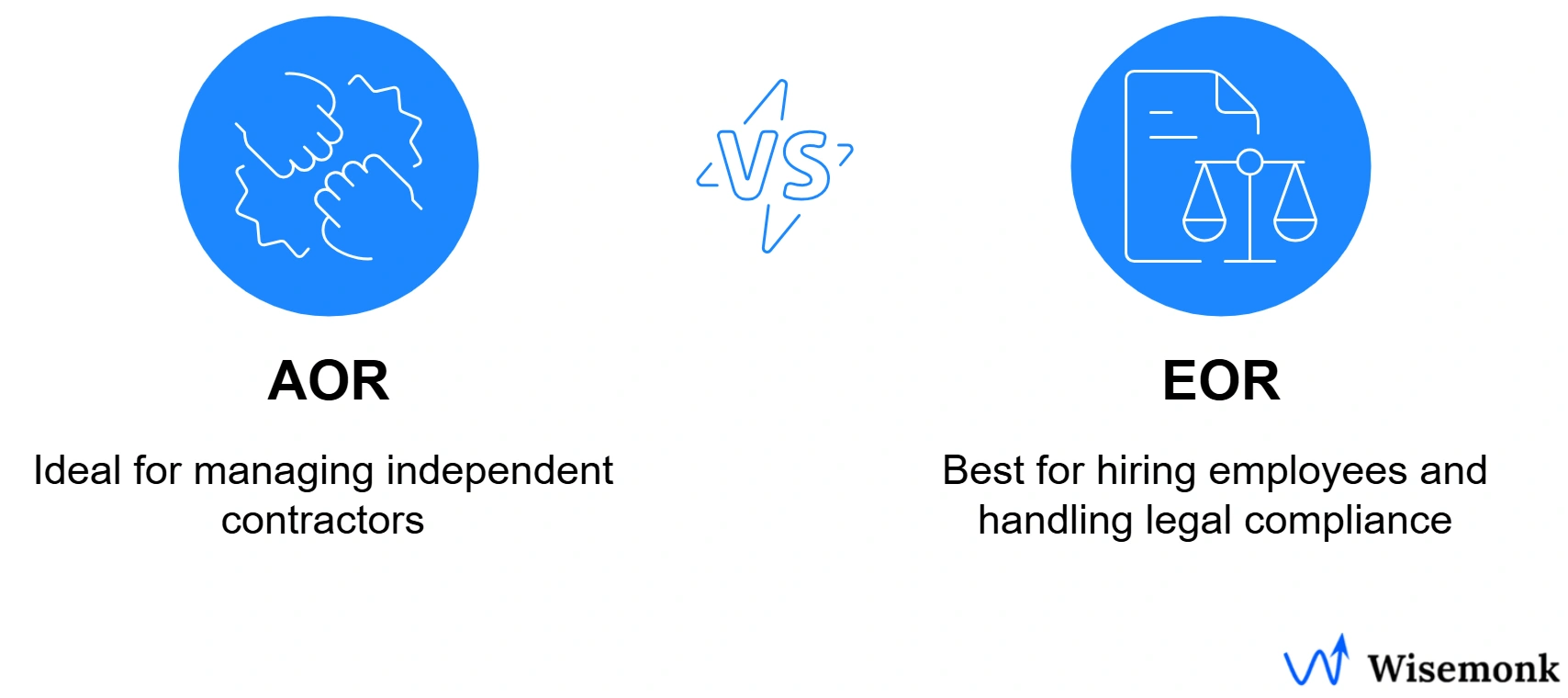
AOR vs. EOR: Choose AOR for managing global contractors, or EOR for hiring full-time employees abroad without a local entity.
Here is a quick comparison table:
Not sure if you need an employee or contractor? Our guide on hiring employees through an EOR instead of contractors breaks down this critical decision.
Now that you understand what each service does, let's talk money. Cost is often the deciding factor when choosing between AOR and EOR, and the numbers can surprise you.
How much do AOR and EOR services cost?[toc=AOR vs EOR Costs]
Pricing varies based on the country, number of workers, and services included. Here's what you'll actually pay in 2026:
AOR pricing for contractors:
Most AOR services charge in one of two ways:
- Percentage model: 3-8% of each contractor's payment
- Flat fee model: $200-$500 per contractor per month
The percentage model is more common and scales with your contractor spend.
If you're paying a contractor $5,000/month and your AOR charges 6%, you'll pay $300/month in service fees.
EOR pricing for employees:
EOR services typically offer two pricing structures:
- Flat monthly fee: $199-$1,000+ per employee per month (most providers charge $300-$650)
- Percentage of salary: 8-20% of gross payroll
Wisemonk's EOR starts at $99/employee/month, positioning us with transparent pricing.
Premium providers like Deel, Remote, and Papaya charge $599-$1,000/month per employee.
What affects the final cost?
Several factors impact both AOR and EOR pricing:
- Country complexity: Hiring in India, Mexico, or the Philippines costs less than hiring in France, Germany, or Japan due to simpler labor laws
- Service level: Basic compliance costs less than full-service packages with benefits administration and dedicated account managers
- Team size: Many providers offer volume discounts for 10+ workers
- Add-on services: Background checks, visa support, equipment provisioning, and custom reporting increase costs
AOR vs EOR vs setting up your own entity:
Setting up a legal entity in a foreign country costs $15,000-$50,000 upfront, plus $50,000+/year in ongoing maintenance (accounting, legal, office space, local staff).
An EOR or AOR eliminates these costs entirely.
Thinking about entity setup? Compare the full costs in our EOR vs Own Entity analysis.
The breakeven point: If you're hiring fewer than 10-15 employees in a single country, an EOR is almost always more cost-efficient than entity setup. For contractors, an AOR remains cost-effective at any scale since you're not taking on employer obligations.
Understanding these costs helps you budget accurately and choose the right service for your business needs. But price isn't everything, let's look at how each service actually works in practice.
How does an Agent of Record work? Step-by-Step[toc=How an AOR Works]
Now that we’ve compared the models, let’s look at how an Agent of Record actually manages independent contractors in different countries.
- Worker classification: The AOR confirms your hire is truly a contractor under local labor laws, not an employee in disguise. This protects you from costly mistakes and misclassification penalties.
- Contract setup: They create compliant service agreements that match employment laws and tax regulations in each country. You get legal protection without hiring lawyers in every market.
- Onboarding: Contractors submit tax forms and identity documents. The AOR makes sure everything aligns with compliance requirements so you stay audit-ready.
- Payments: The AOR handles global payments, currency conversion, and invoicing. Your contractors get paid on time while you avoid time consuming tasks.
- Ongoing monitoring: They watch for signs that a contractor relationship is drifting into employee territory. This keeps you compliant and reduces legal liability.
- Record management: All contracts and compliance documentation stay organized and accessible. When audits happen, you're covered.
An AOR handles managing independent contractors across borders, but they're not the legal employer. If you're hiring full-time employees in new countries, you need an EOR instead.
Next, let’s see how an Employer of Record (EOR) works when you need to hire employees under local labor laws.
How does an Employer of Record work? Step-by-Step[toc=How an EOR Works]
In our experience as a leading Employer of Record in India, and having guided multiple global companies through cross-border hiring, this is how the process typically works:
- You hire: You pick the employee and define their role. The EOR takes on all legal responsibilities as the employer of record in that country.
- Employment contract: The EOR drafts a compliant contract that follows local labor laws and tax laws. No need for your own legal entity.
- Employee registration: Your new hire gets set up in local systems for payroll, tax withholding, and employee benefits. The EOR handles all administrative tasks.
- Payroll and taxes: The EOR runs payroll across multiple countries, files taxes, and manages withholdings. You don't touch the compliance requirements.
- Benefits: Health insurance, retirement plans, and paid leave get handled per local employment laws. Your team gets competitive packages without you managing the details.
- Compliance: The EOR ensures compliance with labor law requirements and assumes legal liability. This protects you when expanding into foreign markets.
- Employee lifecycle: Promotions, exits, visas, performance management, the EOR manages all HR related tasks while you focus on core business activities.
With EOR services, you can hire talent globally and scale your global workforce without the burden of setting up entities in multiple locations. The EOR handles the entire process of employment while you drive global expansion.
When should you choose an Agent of Record (AOR)?[toc=When to Choose AOR]
Choose an AOR when you're hiring independent contractors globally and need help with compliance, payments, and contract management. It's built for project-based work, testing new markets, or building a flexible contractor network.
Go with an AOR if:
- You're hiring contractors across multiple countries and want to avoid navigating different local labor laws yourself.
- You need protection from misclassification penalties and want experts to handle proper worker classification.
- You're tired of managing contracts, tax forms, and renewals across various countries—the AOR takes these time consuming tasks off your plate.
- You want reliable global payments and invoicing without the administrative burden of managing payroll in each country.
- You'd rather focus on core business activities than chase paperwork and compliance requirements.
An AOR gives you cost efficiency and flexibility when engaging independent contractors, but you remain responsible for the relationship. If you're hiring full-time employees instead, you need an EOR.
When should you choose an Employer of Record (EOR)?[toc=When to Choose EOR]
Choose an EOR when you need to hire employees in foreign countries where you don't have a legal entity. It's the fastest way to build international teams while ensuring compliance with local employment laws.
Go with an EOR if:
- You're expanding into new markets and can't wait months to set up your own legal entity in each country.
- You're hiring full-time employees, not contractors, and need a partner to become the legal employer on paper.
- You want full coverage, from payroll processing and tax withholding to employee benefits and labor law compliance.
- You're testing a foreign market and want flexibility to scale your global workforce without long-term entity commitments.
- You're building remote teams across multiple locations and need one partner to handle all HR related tasks.
- You need to hire internationally right now while your own entity setup is still in progress, the EOR bridges that gap.
With EOR services, you hire talent globally while transferring legal responsibilities and administrative tasks to a trusted partner. This lets you focus on global expansion and managing your team's performance.
Still weighing your options? Our guide on choosing an EOR provider walks you through the selection process.
Now that you know when to use each service, let's clear up the biggest misconceptions that trip up companies making this choice.
What are the common misconceptions about AOR and EOR?[toc=5 Common Misconceptions]
Here are the five biggest myths that lead to wrong choices and compliance issues:
1. "An EOR eliminates all my employer responsibilities"
The EOR handles payroll processing, employee benefits, and labor law compliance. You still manage day-to-day work, performance, and business operations.
2. "EOR services are only for international hiring"
Many US companies use EORs domestically to hire across multiple states without setting up a local entity in each location.
3. "Using an AOR removes all my legal liability"
An AOR helps with compliance and managing independent contractors, but you still face penalties if a contractor gets misclassified as an employee.
4. "AOR services only handle insurance and benefits"
Modern AORs manage contract management, payments, worker classification, and ensuring compliance with local labor laws globally.
5. "I lose control over my team with an EOR"
You make all hiring, firing, and performance decisions. The EOR only handles HR related tasks, payroll, and compliance requirements.
Knowing these helps you choose the right service and avoid costly mistakes when building your global workforce.
How do you decide between AOR and EOR?[toc=How to Decide]
Use this quick checklist to choose the right service in under 2 minutes:
Worker type decision:
- Hiring independent contractors for project work? → Choose AOR
- Hiring full-time employees in foreign countries? → Choose EOR
Entity and liability decision:
- Don't have a legal entity in that country? → Choose EOR for employees, AOR for contractors
- Want to transfer legal liability for employment? → Choose EOR
- Okay keeping legal responsibility? → AOR works for contractors
Timeline decision:
- Short-term project or testing new markets? → AOR for flexibility
- Building a permanent team for long-term expansion? → EOR for stability
Compliance priority:
- Main concern is contractor misclassification? → AOR helps, but you carry final risk
- Need full labor law compliance and want to transfer risk? → EOR assumes legal liability
Operational needs:
- Want help with contracts and payments only? → AOR
- Need payroll processing, employee benefits, and HR related tasks handled? → EOR
- Managing both contractors and employees globally? → Use both services together
Choose AOR for managing independent contractors. Choose EOR for hiring employees in multiple locations. Many companies use both to build a flexible global workforce.
Wisemonk: Your Trusted Partner for Global Expansion[toc=How Wisemonk Helps]
Wisemonk is a leading Employer of Record (EOR) in India, helping companies simplify workforce management and ensure compliance while expanding globally.
Here’s how we support businesses:
- We manage recruitment by screening resumes and conducting interviews to present top candidates for your team.
- We ensure full compliance with Indian labor laws, GST, TDS, and income tax for contractors and employees.
- We handle payroll processing for full-time employees, ensuring timely salary payments, tax withholdings, and compliance.
- We provide employee benefits like health insurance, retirement plans, and paid leave, aligned with local market standards.
- We manage employee onboarding and offboarding, handling contracts and work certificates for smooth transitions.
- We help set up local offices and build offshore teams quickly, ensuring compliance with all necessary employee contracts.
How we handle AOR services: For contractors, we take on GST compliance, Income Tax Deduction at Source (TDS), and ensure smooth cross-border payments, so you can engage contractors confidently in India.
Ready to simplify global hiring and scale your business? Contact Wisemonk today and let’s start building your world-class team!
Frequently asked questions
What does AOR mean at work?
An Agent of Record (AOR) is a third-party that helps companies engage and manage independent contractors, handling classification, compliant contracts, and payments, without becoming the employer.
Is using an EOR legally compliant?
Generally yes, an Employer of Record (EOR) is a recognized model where a provider becomes the legal employer and assumes compliance duties under local law; however, specifics vary by country (e.g., rules in Spain are evolving after a 2024 EU court decision). Verify local requirements before hiring.
When to use AOR?
Use an AOR when you’re engaging contractors across borders and need help with classification, local regulations, and cross-border payments, not when you’re hiring employees.
Is EOR a good fit for remote teams?
Yes, EORs are built for distributed/remote teams, covering compliant hiring, payroll, taxes, and benefits so you can manage work while they handle the employer obligations.
What are the pros and cons of AOR?
AOR pros: Cost-efficient contractor management, faster setup than EOR, flexible scaling, and reduced administrative burden. AOR cons: You still carry legal liability for misclassification, no employee benefits coverage, and limited to contractor relationships only.
Can You Use Both AOR and EOR?
Yes, many companies use both services together to manage a hybrid workforce. Use an EOR for full-time employees in multiple countries and an AOR for project-based contractors, this gives you both stability and flexibility as you scale globally.
What is the difference between EOR and AOR?
An AOR manages independent contractors by handling contracts, payments, and compliance, but you remain responsible for the relationship. An EOR becomes the legal employer for full-time employees, taking on all payroll processing, employee benefits, and labor law compliance while transferring legal liability away from you.
